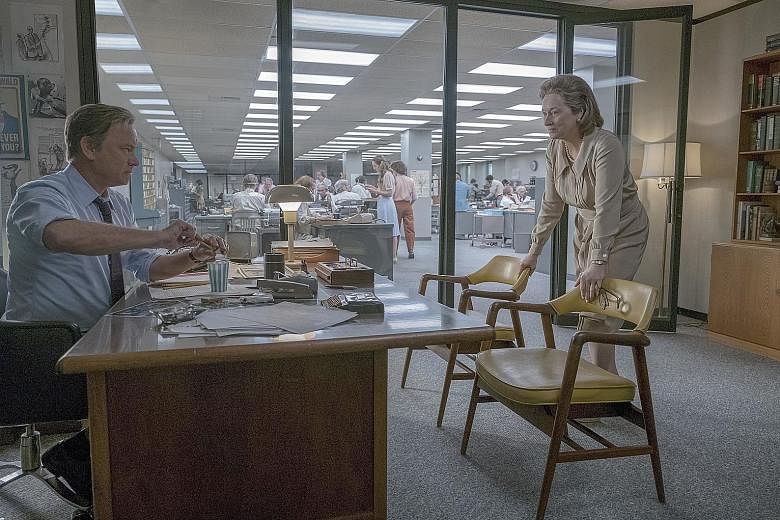WASHINGTON • A little less than a year ago, just before the inauguration of United States President Donald Trump, actress Meryl Streep accepted the Cecil B. DeMille Award at the Golden Globes, using her speech to castigate him for his treatment of the press during his campaign, especially a disabled New York Times reporter.
Streep's remarks - the first widely publicised criticism of Mr Trump by a world-famous figure since his election - became a fulcrum moment in Hollywood.
"It felt like (she) was finally letting the air out of the room," producer Kristie Macosko Krieger recalls. "We were all just keeping our mouths shut for so long and (Meryl was) like, '(Forget) it - I'm not keeping my mouth shut anymore.'"
At the time, screenwriter Liz Hannah's script for The Post, about Washington Post publisher Katharine (Kay) Graham confronting the perilous decision to publish the Pentagon Papers in 1971, was making the rounds in Hollywood.
Immediately after Streep spoke, one of The Post's producers, Tim White, texted Hannah and fellow producer Amy Pascal.
"He said, 'Did you see Meryl give her speech?'" Hannah recalls. "I said, 'Yeah.' And he said, 'That's Kay.'"
Two months later, Macosko Krieger's boss, Steven Spielberg, said he would be directing The Post, with Tom Hanks starring as Washington Post executive editor Ben Bradlee and Streep starring as Graham.
The film was put into production at warp speed, with Macosko Krieger drafting screenwriter Josh Singer (Spotlight, 2015) to work with Hannah on rewrites and assembling an A-list cast to begin filming in May.
The Post will arrive in theatres in the US on Friday, just six months after being put before cameras.
Last Monday, Streep was nominated for another Golden Globe for her performance as Graham.
During a recent conversation in New York with Macosko Krieger, Hannah and Pascal, Streep recalled the days immediately after the election when, alarmed by reports of possible Russian hacking, she got together with Robert De Niro, producer Jane Rosenthal and others (including a former FBI agent) to discuss their anxieties.
"People were really scared and demoralised," she says.
But her swift commitment to The Post came from a different place. "The passion, honestly, that I had wasn't political on that end. It was political on the feminist end. I wish that my citizen heart beat harder than the one that feels the grievance, but that's the way it goes."
When Pascal acquired The Post last year, she was convinced that by the time it came out, it would be a Hillary Clinton-era movie; when Spielberg decided to direct it, he thought it would be a Trump-era movie; now, it is a Weinstein-era movie, with Graham's personal story of overcoming male arrogance having taken on an even more galvanising resonance.
"The movie is about a woman finding her voice," says Pascal, who ran Sony Pictures Entertainment for nine years until she was fired after the company was hacked in 2014.
"How many meetings have I been in where I didn't say a word? 'This actress is (desirable), that actress isn't (desirable), this female director is impossible... How many times have I paid (female actors) less money than their male counterparts? I know because I ran a studio... I know how much I went along with it. And I think of myself as a pretty big feminist."
Streep points out that the same kind of reflexive disregard Graham contends with in The Post also pervades an industry shaped largely by male film-makers.
"Do you know how hard it is for a crew to hear a direct command from a woman and how easy it is to hear a man?" she continues, slipping into character as a confident, in-command male director. "'Get me that light, I need a gaffer to bring that over,'" she barks. "Just that tone, no emollient applied."
Tellingly, the Golden Globes nominations did not include any female directors, despite outstanding achievements this year by Patty Jenkins and Greta Gerwig. Still, a realignment is happening that feels newly energised, maybe even permanent.
Streep says this moment is different from a few years ago, when she was at the Telluride Film Festival with Suffragette (2015) and men's eyes seemed to glaze over every time she connected women's fight for the vote with present-day exclusion and discrimination.
"It's such an ancient grievance that lives in every household: 'Do we have to talk about that again?'
"The eyeroll that isn't even an eyeroll; it just stays very still and waits through this part of the talk, and then we can talk about what we really want to talk about."
WASHINGTON POST
•The Post opens in Singapore on Jan 18.

